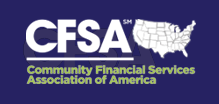In The News: CFPB Can Right Past Wrongs of Small-Dollar Lending Rule
April 29, 2019 | CFSA Commentary
CFPB Can Right Past Wrongs of Small-Dollar Lending Rule
By Dennis Shaul
When the Consumer Financial Protection Bureau finalized its small-dollar lending rule, former Director Richard Cordray touted the rule’s provisions as “common sense.” They were anything but — based more on conjecture and partisanship than credible research.
The CFPB’s original rule was motivated by a deeply paternalistic view that small-dollar loan customers cannot be trusted with the freedom to make their own financial decisions. All told, the original rule stood to remove access to legal, licensed small-dollar loans for millions of Americans. The CFPB’s recently issued notice of proposed rulemaking to rescind part of its 2017 final rule and delay its compliance date gives the bureau a chance to truly protect consumers and let nonpartisan research, rather than rhetoric, guide its actions.
In a recent interview, Cordray claimed that the bureau did “extensive research” when crafting its small-dollar lending rule. His claim demands a true accounting of the facts.
MC/FINANCE: SUBSCRIBE
Get the latest news, data and insights on key trends affecting Wall Street & financial policy.
Under his leadership, the CFPB engaged in rulemaking based on a predetermined, partisan agenda unsupported by evidence. This led to a rule that rested on unfounded presumptions of harm and misperceptions about consumer behavior, simply equating the very use of small-dollar loans with unavoidable, substantial injury to consumers.
Rather than conducting or even considering rigorous, empirical research to support its assumptions, the bureau primarily relied on anecdotes and supportive comments from consumer activists and special interests to craft its agenda — all at the expense of actual consumers. Moreover, it did not even bother to conduct a cost-benefit analysis.
Not only did the bureau fail to demonstrate consumer harm from small-dollar loans in its own research, it also ignored unbiased research and data from outside sources including other government entities. Studies showed that, contrary to the CFPB’s assumptions, small-dollar loan customers would be worse off if their access to credit were restricted.
For example, a report by the Federal Reserve Bank of New York analyzed consumer outcomes in states that had banned small-dollar lending, which found that those consumers had higher rates of bounced checks and bankruptcy filings. Another report by the Federal Reserve Bank of Kansas City warned that “restricting payday lending could deny consumer access to credit.”
In addition to these reports, the Board of Governors of the Federal Reserve demonstrated the widespread need for small-dollar credit, finding that roughly half of Americans could not cover an unexpected expense costing $400. The Federal Deposit Insurance Corp., meanwhile, found that tens of millions of Americans were unbanked or underbanked. The bureau ignored this information, choosing to severely limit a credit source used by millions of Americans.
The little data that the CFPB did collect — data on consumer complaints — consistently showed a very low level of complaints about small-dollar loans, which were dwarfed by complaints against financial products like mortgages and student loans. Yet this information was of no consequence to bureau officials who sought an outcome that they wanted — one that will decimate short-term credit providers and leave millions of consumers without a viable source of credit.
It was not only research and data that the bureau disregarded. It also ignored the very consumers who stood to be harmed by its rulemaking.
More than 1 million small-dollar loan customers submitted comments opposed to the rule, many of whom sent handwritten letters telling personal stories of how small-dollar loans helped them and their families. It is downright insulting to hear Cordray and other partisan officials at the bureau claim they truly considered the needs of these consumers when developing the rule.
It is reassuring that the bureau’s new leadership under Director Kathy Kraninger acknowledged that the original small-dollar lending rule is seriously flawed and lacked sufficient research, and moved forward with a new rulemaking to correct past wrongs under Cordray. The new proposed rule rightly calls into question “the robustness and reliability of the evidence” the CFPB used to support some of the key provisions of its original rule, indicating that the bureau may now be taking a new approach that truly grounds its conclusions in data and research.
The demand for credit will exist whether or not small-dollar loans are available. The CFPB now has the chance to take a new approach to small-dollar lending: one that appropriately balances consumer protection with access to credit. If it truly considers credible independent research and rescinds the portions of the rule based on the whims of special interests, we can guarantee that Americans can continue to access legal, licensed small-dollar loans when they need them.
Dennis Shaul is the CEO of the Community Financial Services Association of America.
Read more via Morning Consult.

